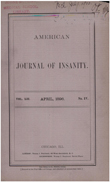Onset conditions for psychological and psychosomatic symptoms during psychotherapy: a new theory based on a unique data set
Abstract
OBJECTIVE: The author's goal was to evaluate theories of the conditions that exist before onset of psychological and somatic symptoms by assessing these preconditions clinically and quantitatively. METHOD: He assembled a set of texts from the cases of seven patients who had recurrent psychological or somatic symptoms and examined the segments of texts that came before the symptoms occurred; he then compared these segments with segments of text that occurred before control points in the same case. The recurrent psychological symptoms were momentary forgetting, shifts in level of depression, and phobic behavior; the recurrent somatic symptoms were stomach ulcer pains, migraine headaches, absence epilepsy (petit mal) episodes, and premature ventricular contractions of the heart. RESULTS: 1)Independent ratings of presymptom segments compared with precontrol segments revealed some significant differences in all seven cases. 2) Some variables that distinguished the presymptom from the precontrol segments occurred in all of the cases. In rank order of their effect size across cases, these variables were hopelessness, lack of control, anxiety, feeling blocked, helplessness, concern about "supplies," depression, and hostility toward the therapist. For example, hopelessness was significant in seven of the seven cases. CONCLUSIONS: For the first time, segments of texts of psychotherapy sessions that occurred before recurrent symptoms have been assembled and analyzed. These brief segments before recurrent symptoms showed more of certain qualities than did segments before control points where no symptoms appeared. On the basis of these results the author constructed a new symptom-context theory of symptom formation and compared this new theory with five classical theories of symptom formation, drawing implications for research and for treatment techniques.
Access content
To read the fulltext, please use one of the options below to sign in or purchase access.- Personal login
- Institutional Login
- Sign in via OpenAthens
- Register for access
-
Please login/register if you wish to pair your device and check access availability.
Not a subscriber?
PsychiatryOnline subscription options offer access to the DSM-5 library, books, journals, CME, and patient resources. This all-in-one virtual library provides psychiatrists and mental health professionals with key resources for diagnosis, treatment, research, and professional development.
Need more help? PsychiatryOnline Customer Service may be reached by emailing [email protected] or by calling 800-368-5777 (in the U.S.) or 703-907-7322 (outside the U.S.).



